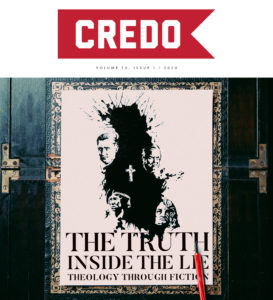In the world of fiction, few have taught me just how scandalous benevolence can be like Don Corleone. In the minds of most, grace is the last thing associated with Mario Puzo’s The Godfather. After all, Don Corleone is a man with blood on his hands, a man of violence and retribution, a man who has taken lives to ensure the prosperity of his family’s business. That is true. And more so. But like every great novel, Puzo’s characters are complex, their finest virtues unveiled in their darkest moments and most hideous sins. And I believe Don Corleone is one such character.
While not a few readers of The Godfather turn pages with an eye towards the sophisticated secrets and brutalities of life in the mafia, Puzo’s persistent fixation on Don Corleone’s character is irrepressible. It is so blatant, so resilient that it makes the reader uncomfortable, challenging preconceived notions that the ideals which made the Don who he is are purely polluted.
From start to finish, Puzo frames the Don’s backstory within his Sicilian heritage. Not today’s Sicily. Yesterday’s. The Sicily whose government was so corrupt that Sicilians learned from birth never to trust it. Even if the police were trying to hunt down the person who murdered your own family, still not a word of cooperation was to be given. Right or wrong, Vito “Don” Corleone brought such assumptions into America with him, which explains why he values familial over national loyalty. Ironic as it sounds, virtue, not vice, drove Vito Corleone into a life of crime. In Sicily, his father was murdered, forever placing Vito under a sentence of death. That sentence, after years of quiet observation, instilled a courage unparalleled in other men, Sicilian or not. The cruel world the Don knew from childhood also cultivated an intelligence: the Don learned never to lose his temper and make threats out of vehemence. Instead, a man need only to reason with his enemy—“What manner of men are we then, if we do not have our reason”—until it was evident his nemesis was unreasonable. Then, and only then, must a man resort to force to ensure his family’s safety and stability.
Despite violent tactics of intimidation, one must work hard to hate a Don so paternal, so patient. For even his rise to power, as corruptible as it is, nevertheless is fashioned from his instincts to help the helpless in his community. Don Corleone cares not about renumeration—which is nothing less than a deep cutting insult. Unlike other Dons, Corleone is not greedy, but cares only for friendship in return. Offer him your friendship, and he will return your pledge with justice. “Friendship is everything. Friendship is more than talent. It is more than government. It is almost the equal of family. Never forget that,” he tells his Godson Johnny Fontane. Steven King once defined fiction as the truth inside the lie. But the Don would say more: the truth inside the lie is coated in the beauty of benevolence. A beauty unabashed, as flagrant as the Don himself. Click To Tweet
Friendship is almost the equal to family, he says, which surfaces another character trait the reader must come to accept, even respect, no matter how inclined one is to despise the Don’s criminal behavior: Don Corleone is a man whose love for family is unsurpassed. His paternal expectations are so out of touch with the culture, so primitive even, that they are biblical: “A man who is not a father to his children can never be a real man,” he says, reflecting on why he is called Godfather. Unlike other Dons who drag their family name through the mud, building their business on the shoulders of prostitution or narcotics, Don Corleone refuses to move beyond entertainment (gambling).
It is this conviction which should have resulted in his own execution if he had not, by some inexplicable miracle, survived half a dozen bullet holes in his chest. True, at the end of the day, Don Corleon is a businessman, and when in a pinch he is known to make an offer that cannot be refused. True again, Don Corleone advises never to take anything personal; it is strictly business, he says, no matter how insulting the threat. Nevertheless, when the Godfather is shot full of holes, it is his own sons who discover that business is personal because their father’s business risks everything for the sake of the family. Unfortunately, Sonny is incapable of reacting in the cool, calculated manner that led so many to respect his father. But as for Michael, in time, and through adversity, such loyalty, such friendship, such patience in the heat of conflict is absorbed, even learned, until he becomes, to everyone’s surprise, his father.
And yet, it is not Don Corleone’s relationships with his own sons that most reveals his character, but with a child who is not Sicilian at all, a child unworthy, in the eyes of every other Don, to be associated with the name Corleone, let alone brought into the Don’s own home. Don Corleone stumbled across Tom Hagen on the streets, a young boy, homeless and likely to die from an infection. The Don took the orphan into his own home, recruited the best doctors, and raised him like one of his own sons. To the Sicilians, Tom was an outsider, an alien, but to the Don, he was a son. Adopted, yes, but with all the blessings of his own bloodline, all the privileges of true sonship.
Almost all.
The Don was sure to give Tom all the opportunities education could promise, and when Tom was finished the world sat before him, ready to bless an ambitious young lawyer with all the prestige he could earn. But Tom declined. Out of sheer gratitude, Tom desired nothing more than to return to the Corleone family and spend the rest of his career in service to the Don. To the Don, there could not have been a higher compliment, nor a greater gesture of respect.
The irony was not lost on the Don either: none of his Sicilian sons—not Fredo, Sonny, or Michael—were fit to succeed their father as Don. But the one son who understood and embraced the Don’s values could not. Never would he be…Don. Nevertheless, he was more Sicilian than anyone; the Don told Tom Hagen so himself. In time, Tom Hagen becomes the Godfather’s Consigliere, his most trusted advisor, his closest friend.
The scandal of the Don’s benevolence—what Don makes an Irishman his Consigliere?—becomes all the more scandalous when the mafia families gather in New York to reach a peace treaty after months of bloodshed, warfare first incited by the attempted assassination of Don Corleone. The Dons all sit down at the same table and each with his Consigliere seated behind him, ready to assist and advice. But the other Dons are mystified, some even repulsed, that Don Corleone, the most respected of all the Dons, has not a Sicilian as his Consigliere. Yet that is no matter to Don Corleone. He treats Tom Hagen as if he is as Sicilian as every other Consigliere in the room. Such unabashed equality comes at a personal cost to the Don. For the presence of an outsider leads some in the room to question Don Corleone’s judgment. But for Don Corleone, it is worth it. He would have it no other way. Tom Hagen is famiglia.
As a theologian, benevolence is at the heart of the message I not only believe but teach others to believe. But it has occurred to me, in all the tomes I’ve read on divine gratuity, rarely has the scandal of benevolence been so vivacious than when incarnated in the character of a criminal like Don Corleone and his unapologetic affection for Tom Hagen. It is one thing to talk about love in the abstract, but altogether another thing to see it embedded within a relationship that, in the estimation of society, should not be.
There is but one exception, and it too is a fictitious story. Someone once told a story about a son who returns to his father after squandering his inheritance on prostitutes and parties, only to have his father embarrass himself in front of society by running to his reprobate son to embrace him as his own once more.
The difference between us prodigals and Tom Hagen, however, is that we adopted orphans enjoy every right, every privilege of sonship. For our Godfather has sacrificed his own Son so that in his Son we might become sons and call him Abba, Father. Heirs with God and fellow heirs in Christ.
Steven King once defined fiction as the truth inside the lie. But the Don would say more: the truth inside the lie is coated in the beauty of benevolence. A beauty unabashed, as flagrant as the Don himself.
Photo credit: Brit-knee


